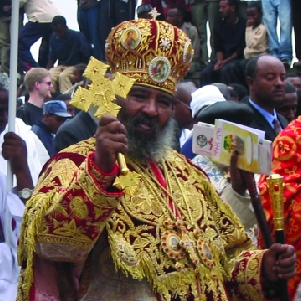Ethiopian Community Gathers to Remember and Honor a Patriarch of their Faith
April 9, 2018 | Alumni, History & Ecumenics, Public, Releases & Statements

PRINCETON, N.J. – As part of Princeton Theological Seminary’s commitment to foster a deeper understanding of Christian traditions worldwide, the Seminary will commemorate the life of one of its distinguished alumni, His Holiness Abuna Paulos, who was known as the Fifth Patriarch and Catholicos of Ethiopia from 1992 to 2012. His Holiness Abuna Paulos was highly acclaimed for his activism, earning him the Nansen Refugee Award from the United Nations in 2000 for his work to support Ethiopians who were displaced by war and impacted by its nation’s severe droughts. He also was one of the seven serving presidents of the World Council of Churches in 2006.
More than a hundred are expected to gather for the special program that is open to the public. It will be held at Princeton Seminary’s library in the Daniel J. Theron Room, 25 Library Place in Princeton, Friday, Apr. 20 at 2 p.m.
Invited guests include His Eminence Bitsue Abuna Zaharias, Archbishop of the Ethiopian Orthodox Tewahedo Church and Archdiocese of New York, the Northeast and Central United States; Very Rev. Dr. Chad Hatfield, president of St. Vladimir’s Orthodox Theological Seminary; His Holiness’ brother, Deacon Tewolde G. YohannesVery Rev. Fr. Amde Tsion-Durden and clergy from St. Michaels Ethiopian Orthodox Tewahedo Church of Englewood, NJ, who will also lead a private ritual prior to the public ceremony. Keynote remarks will be given by Dr. Karlfried Froehlich, professor emeritus of Ecclesiastical History at Princeton Seminary and doctoral advisor to His Holiness Abuna Paulos who graduated in 1988.
“I was a student when His Holiness Abuna Paulos attended Princeton Seminary,” said Paul Rorem, MDiv, PhD, professor of Medieval Church History at Princeton Seminary and key organizer of the program. “Although I knew intellectually that historians could date the start of Christianity in Ethiopia to the fourth century, His Holiness’ presence on campus helped me realize that the Christian church was much more diverse than I previously conceived and much older than I had contemplated.”
To this day, the ecumenical diversity of the student body and faculty at the Seminary provide a dynamic context for understanding the global breadth of the Christian faith.
“Embracing and teaching the many facets of Christian traditions offers our students a richer theological experience and is at the heart of our mission,” said M. Craig Barnes, president of Princeton Seminary.
“Princeton Theological Seminary played a key role in resourcing and supporting the aims and endeavors of the work of this man of God, our father of blessed memory, H.H. Abuna Paulos,” said Archbishop Zakarias. “His great commitment and work in his native country Ethiopia, coupled with his willingness to be a means and resource to all who seek God’s love, hope and message of salvation, sent him abroad and propelled him into the foray of global Christian mission as president of the World Council of Churches and as an Orthodox Christian missionary in the United States.”
The upcoming ceremony reflects the Seminary’s appreciation of the diverse expressions of the Christian faith and serves as a bridge to a spiritual community within a growing immigrant population.
According to Pew research, when compared with other major groups who arrived in the United States in the past five years, Africans had the fastest growth rate from 2000-2013. Within that group, Ethiopia is the second leading country of birth for the foreign-born population from Africa in the United States in 2015.1
This ceremony is just one of several multicultural programs at the Seminary. Recent events include a conference on world Christianity where the focus was on the burgeoning presence of Christianity in the Global South and among the diaspora of its people. In March, the Seminary hosted a symposium on women and violence in Africa. The Seminary also has dedicated research centers, programs and initiatives that focus on a diverse of set of issues and cultures such as the Center for Asian American Christianity; Center for Black Church Studies; Center for Theology, Women and Gender; Hispanic Theological Initiative; Urban Ministry Initiative; and Women in Ministry Initiative.
Editor’s note: In July 2021, this story was updated to reflect the Asian American Program’s renaming to the Center for Asian American Christianity.





